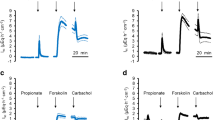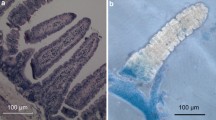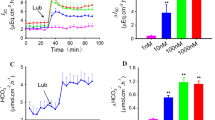Abstract.
We used the Ussing short-circuit technique to investigate the role of HCO3 – in the adenosine 3′,5′-cyclic monophosphate (cAMP)-dependent secretory response of the human distal colon. In HCO3 –-free 4-(2-hydroxyethyl)-1-piperazineethanesulphonic acid (HEPES)-Ringer's, forskolin (10 µmol l–1 mucosal and serosal) evoked a sustained increase in short-circuit current (I sc) (ΔI sc=24±3 µA cm–2, n=57). However, this was only 25% of the forskolin-stimulated I sc response in HCO3 –-Ringer's (ΔI sc=84±8 µA cm–2, n=57). The reduced response to forskolin in HCO3 –-free HEPES-Ringer's was not due to inhibition of the secretory mechanism by HEPES, as replacing HCO3 – with a different buffer, N-tris[hydroxymethyl)methyl-2-aminoethanesulphonic acid (TES), had a similar effect and inclusion of HEPES in the HCO3 –-Ringer's did not reduce the secretory response. Similarly, it was not due to an indirect modulation of electrogenic Cl– secretion, as the forskolin-stimulated bumetanide-sensitive I sc was comparable in the two Ringer's. Rather it was due to the activation of a HCO3 –-dependent I sc which was inhibited by serosal 4,4′-diisothiocyano-stilbene-2,2′-disulphonate (DIDS). This DIDS-sensitive I sc was not inhibited by acetazolamide, but it was inhibited by the replacement of bathing solution Cl– with gluconate, suggesting a role for a Na+-dependent Cl–/HCO3 – exchanger in the cAMP-dependent secretory response of the human distal colon.
Similar content being viewed by others
Author information
Authors and Affiliations
Additional information
Received after revision: 29 November 2000
Electronic Publication
Rights and permissions
About this article
Cite this article
Taylor, .J., Hamilton, .K. & Butt, .A. HCO3 – potentiates the cAMP-dependent secretory response of the human distal colon through a DIDS-sensitive pathway. Pflügers Arch - Eur J Physiol 442, 256–262 (2001). https://doi.org/10.1007/s004240100522
Received:
Accepted:
Issue Date:
DOI: https://doi.org/10.1007/s004240100522




